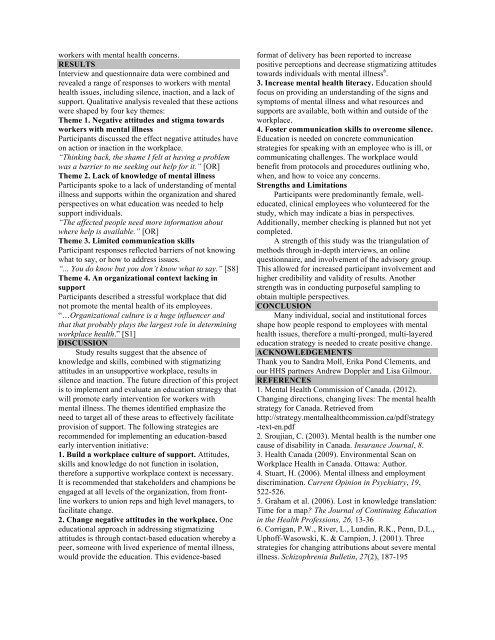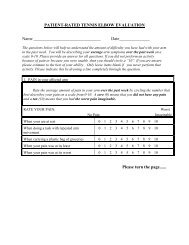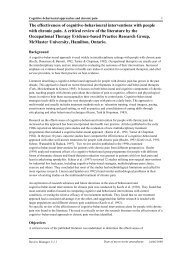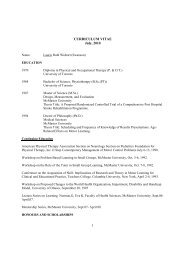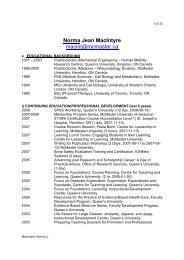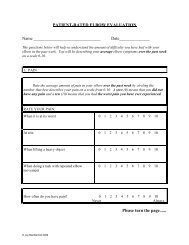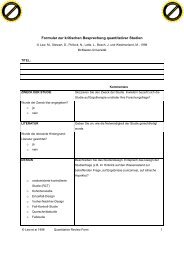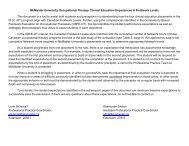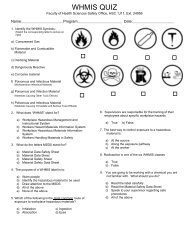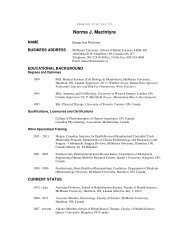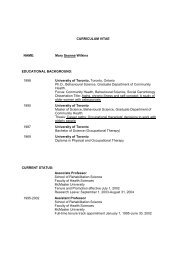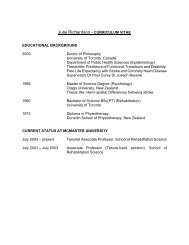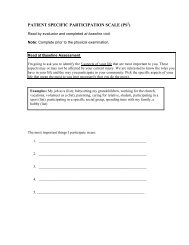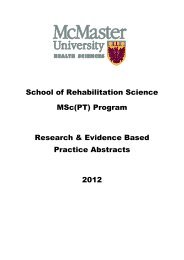Evidence Based Practice Symposium - McMaster University
Evidence Based Practice Symposium - McMaster University
Evidence Based Practice Symposium - McMaster University
Create successful ePaper yourself
Turn your PDF publications into a flip-book with our unique Google optimized e-Paper software.
workers with mental health concerns.<br />
RESULTS<br />
Interview and questionnaire data were combined and<br />
revealed a range of responses to workers with mental<br />
health issues, including silence, inaction, and a lack of<br />
support. Qualitative analysis revealed that these actions<br />
were shaped by four key themes:<br />
Theme 1. Negative attitudes and stigma towards<br />
workers with mental illness<br />
Participants discussed the effect negative attitudes have<br />
on action or inaction in the workplace.<br />
“Thinking back, the shame I felt at having a problem<br />
was a barrier to me seeking out help for it.” [OR]<br />
Theme 2. Lack of knowledge of mental illness<br />
Participants spoke to a lack of understanding of mental<br />
illness and supports within the organization and shared<br />
perspectives on what education was needed to help<br />
support individuals.<br />
“The affected people need more information about<br />
where help is available.” [OR]<br />
Theme 3. Limited communication skills<br />
Participant responses reflected barriers of not knowing<br />
what to say, or how to address issues.<br />
“... You do know but you don’t know what to say.” [S8]<br />
Theme 4. An organizational context lacking in<br />
support<br />
Participants described a stressful workplace that did<br />
not promote the mental health of its employees.<br />
“…Organizational culture is a huge influencer and<br />
that that probably plays the largest role in determining<br />
workplace health.” [S1]<br />
DISCUSSION<br />
Study results suggest that the absence of<br />
knowledge and skills, combined with stigmatizing<br />
attitudes in an unsupportive workplace, results in<br />
silence and inaction. The future direction of this project<br />
is to implement and evaluate an education strategy that<br />
will promote early intervention for workers with<br />
mental illness. The themes identified emphasize the<br />
need to target all of these areas to effectively facilitate<br />
provision of support. The following strategies are<br />
recommended for implementing an education-based<br />
early intervention initiative:<br />
1. Build a workplace culture of support. Attitudes,<br />
skills and knowledge do not function in isolation,<br />
therefore a supportive workplace context is necessary.<br />
It is recommended that stakeholders and champions be<br />
engaged at all levels of the organization, from frontline<br />
workers to union reps and high level managers, to<br />
facilitate change.<br />
2. Change negative attitudes in the workplace. One<br />
educational approach in addressing stigmatizing<br />
attitudes is through contact-based education whereby a<br />
peer, someone with lived experience of mental illness,<br />
would provide the education. This evidence-based<br />
format of delivery has been reported to increase<br />
positive perceptions and decrease stigmatizing attitudes<br />
towards individuals with mental illness 6 .<br />
3. Increase mental health literacy. Education should<br />
focus on providing an understanding of the signs and<br />
symptoms of mental illness and what resources and<br />
supports are available, both within and outside of the<br />
workplace.<br />
4. Foster communication skills to overcome silence.<br />
Education is needed on concrete communication<br />
strategies for speaking with an employee who is ill, or<br />
communicating challenges. The workplace would<br />
benefit from protocols and procedures outlining who,<br />
when, and how to voice any concerns.<br />
Strengths and Limitations<br />
Participants were predominantly female, welleducated,<br />
clinical employees who volunteered for the<br />
study, which may indicate a bias in perspectives.<br />
Additionally, member checking is planned but not yet<br />
completed.<br />
A strength of this study was the triangulation of<br />
methods through in-depth interviews, an online<br />
questionnaire, and involvement of the advisory group.<br />
This allowed for increased participant involvement and<br />
higher credibility and validity of results. Another<br />
strength was in conducting purposeful sampling to<br />
obtain multiple perspectives.<br />
CONCLUSION<br />
Many individual, social and institutional forces<br />
shape how people respond to employees with mental<br />
health issues, therefore a multi-pronged, multi-layered<br />
education strategy is needed to create positive change.<br />
ACKNOWLEDGEMENTS<br />
Thank you to Sandra Moll, Erika Pond Clements, and<br />
our HHS partners Andrew Doppler and Lisa Gilmour.<br />
REFERENCES<br />
1. Mental Health Commission of Canada. (2012).<br />
Changing directions, changing lives: The mental health<br />
strategy for Canada. Retrieved from<br />
http://strategy.mentalhealthcommission.ca/pdf/strategy<br />
-text-en.pdf<br />
2. Sroujian, C. (2003). Mental health is the number one<br />
cause of disability in Canada. Insurance Journal, 8.<br />
3. Health Canada (2009). Environmental Scan on<br />
Workplace Health in Canada. Ottawa: Author.<br />
4. Stuart, H. (2006). Mental illness and employment<br />
discrimination. Current Opinion in Psychiatry, 19,<br />
522-526.<br />
5. Graham et al. (2006). Lost in knowledge translation:<br />
Time for a map? The Journal of Continuing Education<br />
in the Health Professions, 26, 13-36<br />
6. Corrigan, P.W., River, L., Lundin, R.K., Penn, D.L.,<br />
Uphoff-Wasowski, K. & Campion, J. (2001). Three<br />
strategies for changing attributions about severe mental<br />
illness. Schizophrenia Bulletin, 27(2), 187-195


